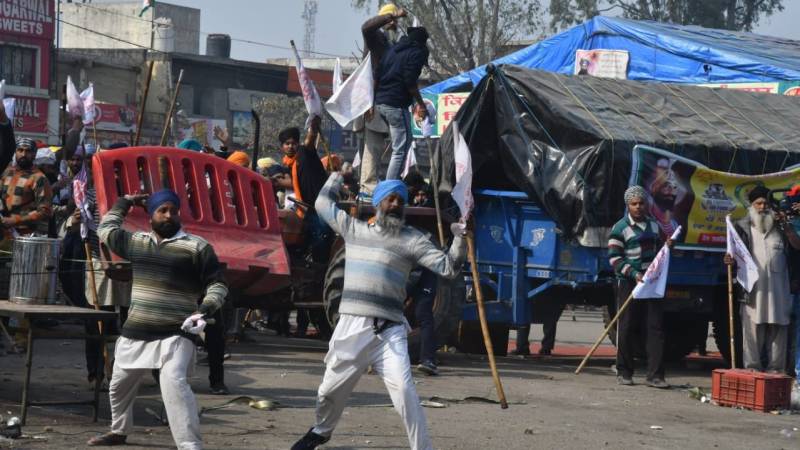New clashes heighten tensions at India farmer protests

Stay tuned with 24 News HD Android App

Clashes erupted Friday between hundreds of opponents and supporters of a major farmers protest that has disrupted the Indian capital for more than eight weeks.
At least one farmer was seen brandishing a sword during the latest unrest to overshadow two months of protests against the liberalisation of farm produce markets. Police fired tear gas and baton charged rival groups to separate them.
Tensions have been building around the farmers' camps since Republic Day on Tuesday, when a tractor rally turned into a citywide rampage which left one farmer dead and nearly 400 police injured.
The government has deployed thousands of extra police and paramilitaries in Delhi and around the camps since then. One small camp has been closed, as have many roads around the protest sites.
Some local groups have said the farmers should leave. Farmer leaders have insisted their action will go on.
"When we don't have any land left, when we are unable to cultivate any crops, we are going to die anyway," said Bhagwant Singh, a 53-year-old farmer at Singhu.
"At least if we die here protesting, we will be martyrs. We will fight and die for the rights of the people of this country."
On Friday, one police officer was wounded in the hand during a scuffle with a sword-wielding farmer, an AFP reporter at the scene said.
And masked men, shouting "shoot the traitors", charged the farmers, breaching police cordons and steel barricades.
Power cut
Authorities cut power and water to one protest camp at Ghazipur, but hundreds more farmers arrived overnight on tractors to reinforce what has become the biggest challenge to Hindu nationalist Prime Minister Narendra Modi since he took power in 2014.
Tens of thousands of farmers have been at the camps since late November and despite this week's violence, their leaders have signalled they are digging in for a prolonged new showdown.
They are opposing reforms which aim to deregulate farm produce markets that have for decades been organised by state bodies with minimum prices guaranteed. Those protesting say the changes will let Indian conglomerates take over the farming industry.
Farming provides jobs for two thirds of India's 1.3 billion population, but the government says the industry is inefficient and the reforms will boost rural incomes.
President Ram Nath Kovind told the opening of a budget session of parliament that the storming of the landmark Red Fort by protesters on Tuesday had been an "insult" to the national flag.
But in a sign of the growing political divisions caused by the dispute, opposition parties boycotted his speech.
While farmers have called off a plan to march on parliament on Monday -- when the government outlines its annual spending plan -- they reaffirmed their determination to stay at the camps.
Leaders brought in generators to provide power, while the Delhi regional government, run by an opposition party, organised water tankers.
Some of the newly arrived protesters said they had been inspired by a tearful video issued by Rakesh Tikait, one of the dozens of farmer leaders who now face a police inquiry over the unrest and the assault on the Red Fort.
Farmers banged ladles on pots through the night, urging each other to stay awake because of worries of police action.
"The government is trying to derail our protest through lies and mischief," said Sukhdev Singh, a farmer in his 30s. He said their families in Punjab state were worried but did not want them to return.
"We won't budge from here till the laws are taken back -- even if that takes a day, a month or a year or 10 years."
